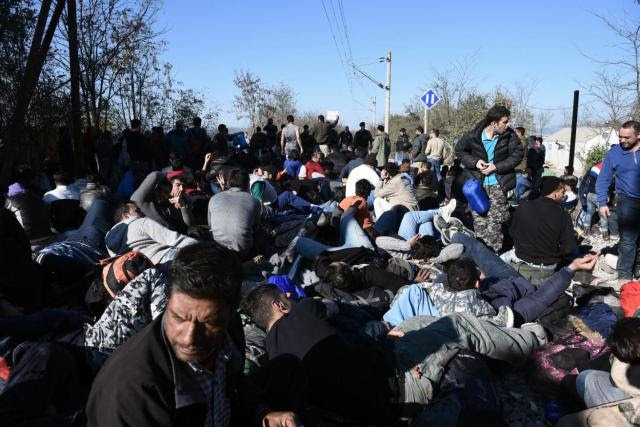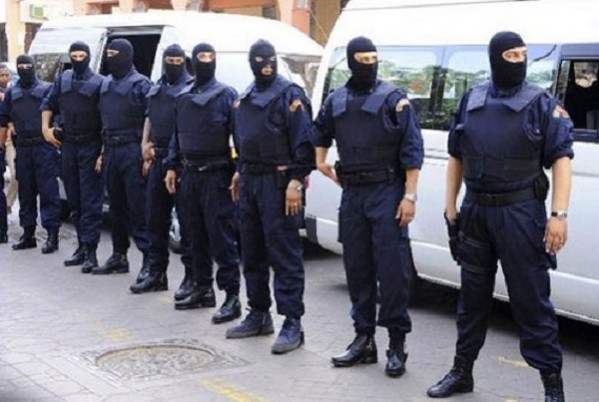US News & World Report
By Dusan Stojanovic, AP
Migrants sit at no man’s land near Idomeni village, northern Greece on Thursday, Nov. 19, 2015. The United Nations refugee agency says Macedonia has begun allowing only people from Syria, Iraq and Afghanistan to cross its southern border from Greece, while Greek authorities say migrants of other nationalities are gathering on the Greek side of the border and blocking the crossing completely.
Most nations along Europe’s refugee corridor abruptly shut their borders Thursday to those not coming from war-torn countries such as Syria, Afghanistan or Iraq, leaving thousands desperately seeking a better life in the continent stranded at Balkan border crossings.
The overnight decision triggered the domino effect that both asylum-seekers and European nations had feared given the record number of people fleeing to Europe this year, and reflected new worries about possible militants coming in with the refugees.
Macedonia, Serbia, Croatia and Slovenia weren’t allowing in so-called economic migrants whose countries aren’t shattered by war. To cross, asylum-seekers needed to display identity documents to prove that they are from Syria, Afghanistan or Iraq — which many of them could not, even if they did come from those states.
“We’re extremely worried about the latest developments and fear that people will be stranded without any assistance, shelter and food just as winter sets in,” said Stephane Moissaing, the Doctors Without Borders head in Serbia.
“It is not acceptable that people who want to seek asylum are being segregated by nationalities,” Moissaing added. “The right to ask for asylum is universal and cannot be connected to certain nationalities.”
In the Greek village of Idomeni at the border with Macedonia, police said the border was essentially shut down to all since Thursday morning. Some 3,000 people were waiting at a camp nearby that provides temporary shelter for those heading north through the Balkans.
About 500 people from Iran, Morocco and Algeria gathered on the border between Greece and Macedonia to protest the closure. As a result, nobody else from the nationalities that Macedonia is letting through — Syrians, Afghans or Iraqis — were able to cross.
Dariush Yazdani, 25, from Tehran, said he was determined to reach Germany and faced imprisonment were he to return to Iran.
“I will never go back,” he said.
Mohammed Mirzam, a 30-year-old from Afghanistan, knew he could go across but his wife and two children, Ilia, 5, and Elena, 3, are Iranians who would be blocked.
“We’re trapped,” he said from the Greek side of the border at Idomeni. “They won’t let my family across. We have no money, and we’re waiting without any idea of what is to happen.”
On the Serbian border with Macedonia, the Serbs were letting in only migrants from Syria, Afghanistan and Iraq. And on the Croatia-Serbia border, Croats were only accepting people from those three countries plus Palestine.
Slovenia — the next country in the chain — also said it has been turning back economic migrants.
“This is going to be definitely a challenging situation,” U.N. refugee agency spokeswoman in Serbia Melita Sunjic said. “UNHCR does not think that there is any nation that can be excluded from international protection …. each case individually should be screened.”
The partial closure of the borders could trigger huge pileups of desperate people along the Balkan corridor that has seen hundreds of thousands of people cross as they head to wealthy EU states, mostly Germany. Although Syrians are the biggest group among the asylum-seekers, tens of thousands of people fleeing poverty — such as Pakistanis, Bangladeshis or Sri Lankans — have also joined the surge.
Serbian Labor Minister Aleksandar Vulin blamed EU-members Slovenia and Croatia for the ban, saying they have started turning back economic migrants — those fleeing poverty, not war.
“We have to protect our country. That is why we have applied reciprocal measures toward the people Slovenia and Croatia have no room for,” Vulin said.
Slovenia’s decision to start turning back people it considers economic migrants triggered the chain reaction along the Balkan migrant route.
“These foreigners do not qualify for international protection,” said Slovenian police spokesman Drago Menegalia.





